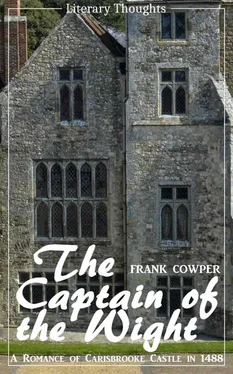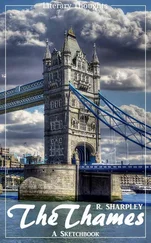"Nay, Master Dicky malapert, I know no such thing."
"Then you don't know much, as I always said," retorted Dicky.
"Marry, Dicky, I'll have to wallop thee once more, I see. You're growing saucy again."
"Wallop me i' faith!" sneered Dicky; "I'd like to see you doing it."
"Wait till we get on board the barge then, and you'll soon be satisfied."
Willie Newenhall never engaged in these wordy contests. He only thought of his appearance, when he was going to feed again, or of the danger he was always in from the fair sex, by reason of his own good looks. The other pages knew well his weak points, and would always chaff him on the risks he ran from his many fascinations.
"I' faith, Willie, there's a pretty lass looking at thee; and that's her brother, or sweetheart, with her. How fierce he looks. Ah, if you look at her that way, he'll be murdering you presently," added Dicky, as Willie looked round nervously, to see the group his comrade was referring to, only to meet with a jeering remark from the apprentice who was standing by the girl, of "Hi, young round knave, pudding chops or pig's eyes, what do you lack here?" or some equally elegant observation, which caused Maurice and Dicky to laugh derisively, and the men-at-arms and archers, who were close behind, to grin broadly.
But Willie was far too stupid to make any retort, he only grunted angrily, and leered at the people on the other side of the street.
Then they passed through Southampton, under the noble Bargate, with its figure of Bevis of Hampton, and the giant Ascapart, whose reality all true townsfolk believed in, and of whose doughty deeds with Guy of Warwick Ralph had often heard and longed to emulate. The cavalcade rode down the long street under the old west gate tower, and outside the splendid old walls, on to the town quay.
Oh, the sight of the gleaming water! Ralph had never seen the sea before--how it glanced and sparkled in the mid-day sun of June. The dim haze of the opposite shore, where stretched the New Forest away and away far into the land and down the coast, with all its memories of ancient times. The splash of the little waves, rippling before the fresh north breeze, as they sparkled against the bluff bows of the unwieldy barges or straighter stems of the swifter galleys. How stately was the curve of a high-prowed, lofty-pooped merchant ship as she came round to the helm, while all her sails fluttered in the breeze as her bows ran up in the wind, and the heavy splash told of the weighty anchor dropping to the muddy bottom of the Teste.
Then the smells, the sounds, the cries. Ralph had never enjoyed life before. All the instincts of his race came out in him,--of that ancient race of the island, whose origin was lost in the dim vista of antiquity, whose lands belonged to the mysterious sons of Stur long before the Norman Conquest, and passed by marriage to De Lisle, if indeed De Lisle was not simply the Norman form of expression for the original lord of the island, for who could more worthily be called "de insula" or "of the island" or "De Lisle" than that family which was above all others "of the island?" since the possessions of the "filius Azor" or "Stur" are the most important of any, as recorded in Domesday book.
The instincts of his sea-girt ancestors rose in him, and Ralph Lisle gazed at the dancing water with eager delight.
The scene of confusion that then followed delighted him still more. The getting the horses on board, the telling off the various parties each to its own barge, the excitement of pushing out into the stream, or warping the larger vessels off to their kedge anchors, which were dropped in the middle of the fairway, all this was delicious, and Ralph felt he was in a wonderful dream.
"Mind your eye, young Popinjay!" bawled a burly seaman. "Stand clear o' that warp now," as Ralph took his stand on a large coil of rope near the bows. "Such a gay bird as you should know better than to stand on a warp that way. Did yer think 'twas a doormat?"
In a few minutes the barge was hauled out into the stream, the anchor was right up and down.
"Haul away there," called the captain.
Out flapped the big foresail in the breeze, the jib was run out, the anchor was up, and hanging at the bows, already the water was chattering under her stem.
"Now then, my lads, shake out that mainsail. Look alive there!" bawled the skipper, and the great white sail dropped down from the mainmast and longyard, where it had been brailed up, and swelled out in the breeze, louder chattered the wavelets under the bow, and merrily the seamen sheeted home the ropes.
Ralph had now time to look round him. He was on the same barge as Lord Woodville and his immediate escort. The horses with the grooms and men-at-arms were on a large barge that was running alongside of them. On their right, but a little astern, was another barge containing the rest of the troop, and among them Ralph was glad to see the beggar man and his daughter.
The baggage and vanguard had gone on early in the morning, under the charge of Tom o' Kingston.
Ralph looked up at the swelling sails and the tall masts. The barge was bluff-bowed and high-sterned, like those remnants of the Middle Ages the Breton and Norman chasses marées of modern times, and like them she carried three large lug sails, and one jib, set far out on a high peaked bowsprit.
As this was the barge of the captain of the Island, she was far better appointed than the other vessels. Her sails were white, and adorned with the arms of the Lord Woodville, argent, a fess, and canton, gules, while the mainsail bore the arms of Newport, the capital of the Island. The ropes were all white and new, and the decks and bulwarks were scrupulously clean, and the latter fresh varnished.
Ralph was never tired of looking aloft at the large blocks or pulleys, the strong ropes, the stout masts, and the swelling sails lazily falling in graceful folds as the breeze died down, or bellying out to the fresher puffs of the fair weather wind.
He leaned over the side and watched the ripple of the water as the hull glided through it. How dark green the sea looked on the side where the shadow of the hull and sails fell, how mellow and blue it sparkled on the side where the sunlight shone upon it. He looked at the other barges; they were rippling through the sea, a little fount of water spouting up under the cutwater, and glancing off the bows in a lovely curve of spray, the one vessel all shadow, the other all bright and gleaming in the sun.
The tide was running out strongly. Swiftly they flew past Netley, its abbey towers rising out of the green woods, the toll of its bell sounding over the water the hour of nones; gaily they flew past the mouth of the Hamble, and in a short time were gliding out by Calshott Spit, running before the breeze into the stronger ripple of the main tide of the Solent.
But long ere this Ralph had been summoned to dinner, and for the first time he was called upon to wait upon his lord. It was his duty to serve him with wine, and deftly he performed his task, for he had been well taught at home. The motion of the vessel was scarcely perceptible, and his hand was very steady. After the Captain of the Wight and his guests had been served, the pages sat down apart to their repast, and Ralph was astonished at his own appetite.
"I tell you what it is, little eyes," cried Dicky, "you'll have to look after yourself, or Lisle will leave you nothing to eat."
To this Willie Newenhall made no answer, but glanced askance at Ralph, and eat away harder than ever.
"There, there, Willie, dear, don't be afraid; he'll leave you a bit, if you are a good lad, I don't doubt," laughed Maurice.
It had been Bowerman's duty to attend closely upon his lord, and he had found no opportunity to put his threat in execution. However, now the repast was over, he began to remember what had passed.
Читать дальше












